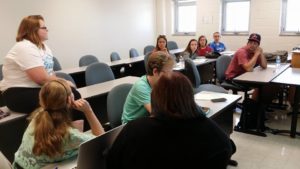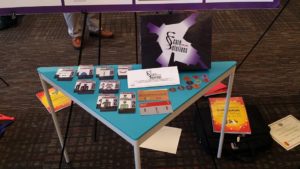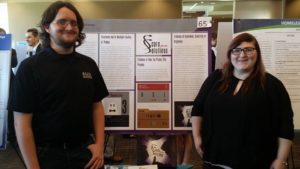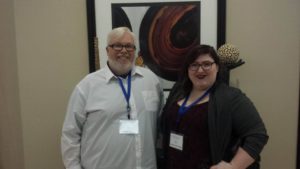Teaching Philosophy PDF
 When people ask me what I do, I often distinguish between two parts of my job. Though rewarding, research and writing are the “work” parts of my job, while teaching is the “fun” part. By creating a classroom atmosphere that focuses on reading as a transformative experience facilitated by writing, I strive to pass on my passion for teaching and learning to my students. While I realize the difficulty in reaching all the students I teach, each missed opportunity to help a student experience the fun in learning spurs me on to create new and better ways of teaching.
When people ask me what I do, I often distinguish between two parts of my job. Though rewarding, research and writing are the “work” parts of my job, while teaching is the “fun” part. By creating a classroom atmosphere that focuses on reading as a transformative experience facilitated by writing, I strive to pass on my passion for teaching and learning to my students. While I realize the difficulty in reaching all the students I teach, each missed opportunity to help a student experience the fun in learning spurs me on to create new and better ways of teaching.
For example, despite the specifications of an assignment, many students initially regard me as the primary audience of their essays—a common tendency in undergraduates. In response, I created an assignment in which I ask students to submit a nomination to the National Film Registry at the Library of Congress. This assignment not only provides an opportunity to discuss evaluation in expository writing, but also furnishes a defined “real” audience outside the classroom. Students then mail the essays to the Library of Congress. Many of them, consequently, receive messages about their submissions and derive a firm sense of accomplishment from the experience. Before they post the essays, the students must revise their initial drafts. The fact that outside authorities will read these essays encourages students to think about global and local revisions in a thoughtful way, and future essays are often more polished as a result.
Exercises such as this one employ a version of problem-based learning (PBL), a crucial component of my teaching philosophy. This method provides students with a challenging way to approach the learning process, and it also challenges me as a teacher and prevents me from settling into a routine. PBL begins with students working in small groups, delving into and determining key issues to solving a “real-world” problem under the guidance of a facilitator. By focusing on a realistic problem, students develop a varied perspective and a deeper knowledge of the subject area. PBL shows students that concepts discussed in literature and composition courses are not devoid of the experiences of real life.

One such transformative experience occurs in my Theories and Technologies of Writing course, where we engage in role play for a group project that discusses some of the major theoretical approaches to writing studies. I tell the students that they have been chosen to serve on the English Committee for Interactive Theory Education (ExCITE). The project asks the students to describe the primary tenets of a particular school of rhetorical criticism or writing studies methodology, to demonstrate how the theory can be applied to texts in order to not only further understand the texts but also the theory itself, and to use some kind of interactive activity as a tool to communicate these points. This project is often the students’ first encounter with the theories, methods, and practices of writing studies. In developing creative ways to communicate difficult ideas to their audience, they arrive at a greater understanding of the rhetorical strategies that theorists use. One group wrote a soap opera in which each of the characters represented an idea offered by Elizabeth Eisenstein and Adrian Johns in their approaches to the history of the book. After we acted out the roles, the students used the content and ideas performed in the presentation to shape our discussions for the rest of the semester. Another group had the class create memes and used Carolyn Miller’s conception of genre, in conjunction with Bradley Wiggins’s ideas about participatory culture, to establish memes as a genre in their own right.


While I know that my courses will not transform every student, I always strive to guide students to understand the relation of linguistic and visual representations to the world around them. Consequently, my Persuasive Gaming class provides its participants with a critical awareness of the complex and ever-evolving interaction between texts and images in participatory culture. Using Ian Bogost’s framework of procedural rhetoric, the students come to understand how the processes of gaming use simulated procedures to mount arguments about how real-world procedures work. The semester-long project for this course had students create their own persuasive game prototypes involving the difficulties of escaping poverty, the problems of our current prison system, and the ways that racism, sexism, classism, and ableism become embedded in culture. This assignment allows students to see how their work contributed to a larger academic conversation, as one group has continued to work on their game and plans to build a Kickstarter campaign to produce it.

One of the drawbacks of PBL has also helped me to develop one of my strengths as a teacher. Because PBL focuses on key issues of a specific problem, I understand that PBL does not always promote free-form discussions that often lead to “eureka” moments for the students. A former student once wrote that she appreciated how I go “along with the flow of the class conversation.” While I have teaching objectives, such as understanding the methods of characterization in a novel or considering the ways in which workplace discourse represents marginalized groups, I also appreciate the importance of the process of developing one’s own critical voice. This process often involves straying from the intended path, but those moments when we venture into unknown territory are the most valuable for the students and the most exciting for me as a teacher.
Student Comments
Allison Colson, a PSU non-traditional student and tenured community college professor seeking professional development: “Dr. McDaniel demonstrates his own enthusiasm for the subject matter through his animated delivery and enjoyable—often humorous—examples. This enthusiasm is infectious, and his class discussions invite active participation with students often providing further examples of the subject matter. McDaniel also demonstrates compassion, recognizing when students need additional instruction or additional time. This assistance was made available both during class, for example, in the computer, and outside of class, such as when I struggled with formatting pages in Joomla on my own.”
Alexander Sheppard, PSU undergraduate English Alumnus: “…Dr. McDaniel has guided me through the English department at Pittsburg State University and has been an integral part of my robust experience in navigating the technical writing emphasis. As a teacher Dr. McDaniel’s technical writing class piqued my interest in the program and eventually led to me pursuing it as a major…. McDaniel also provided me an opportunity to participate in the Council for Programs in Technical and Scientific Communication (CPTSC) conference this past semester in Houghton, Michigan…. My contribution at the conference helped push me as a student and a person; it gave me a unique insight into the opportunities of technical writing.”
Michelle Gorges, a PSU undergraduate English alumnus, now in the graduate program: “…Jamie goes above and beyond the call of duty by doing more than simply answering questions; he really gets to know his students and advises them specifically based off of their experiences, preferences, and overall goals. For example, Jamie’s guidance has led me to several incredible opportunities and experiences that I truly hoped to achieve and would not have found without him, including involvement in a graduate-level grant-writing project as well as two technical writing and editing internships.”
Michelle Fields, PSU undergraduate English alumnus: “It was [Dr. McDaniel’s] passion for Technical/Professional writing which inspired me to change my major to Technical/Professional writing.”
Nevin Jones, a PSU undergraduate English alumnus: “…I have hopped around to three different majors which allotted me the misfortune of having to deal with three different advisers. I say misfortune because my first two interactions with advisers usually ended in some kind of miscommunication…but I have never had that problem with Jamie. Ever since I changed my major to Technical Writing interaction with my adviser has become far easier…. On the rare occasion that he cannot help me, he has referred me to the correct person to fix my problem.”
Anna Carpenter, a PSU undergraduate and graduate English alumnus: “[Dr. McDaniel] has given me much practical, helpful information about the field of Technical/Professional Writing and is always careful to tailor his advice to the students’ needs and concerns. He has taught me much about current and past scholarly conversation in my field, something I find indispensable.”
Kylie Klenke, a PSU undergraduate alumnus: “I still consider [Dr. McDaniel to be a major part of my support network, just as he was when I was a student. When I ran into trouble with the first job I had out of college, he was the first person I went to for advice since I trust his solid judgment when it comes to dealing with difficult people and situations. His honesty and openness cause me to view him as a friend in addition to the valuable resource he has proven himself to be in the Technical Writing field. He is truly an irreplaceable part of the PSU campus….”
Colleague Comments
“You let the students run with the discussion until it seemed that it might get out of hand because of passionate disagreements among the students. The fact that the students felt so strongly about the novel was a testament to your ability to make the literature interesting and to create an atmosphere in which students felt free to express their interpretations and the differences in those interpretations. When the discussion did threaten to stray too far from valid discussion points or to become tangled in irresolvable knots, you quickly stepped in and brought things under control without deflating the students’ enthusiasm. You also made sure that the discussion was not dominated by only the more vocal students, but that all students who wanted to comment had a chance to do so…. I could see the students developing more informed, more nuanced interpretations of the novel.” (from Celia Patterson, Chair of the English Department on a Sexy British Novel class visit).
“Having led students through a new computer procedure before, I understood how much time you had to have spent before class to make the process go as smoothly as it did. You provided them with an overview and a handout that included all the terminology they would need. Then you led them step by step through the process, always maintaining a jovial tone that helped lessen the frustration students inevitable feel when they attempt a new computer procedure with all its unavoidable glitches…. And at the end of the class, you expressed your commiseration with all their frustrations. They seemed to feel at the end that they had a grasp on how to use the content management system. You obviously have a good understanding of how to connect with your students so that they feel you are coaching them rather than preaching to them, and that’s exactly what they need when learning a process such as the one they learned today.” (from Celia Patterson, Chair of the English Department on a Document Design class visit).
“Your classroom management was deft and purposeful. Every moment was purposefully occupied, but I never felt that you were rushing things along or cutting necessary elements short in order to get on to the next thing…. Above all, however, what impressed me about your [class] was the rapport you had with your students. At the risk of sounding saccharine, I’ll say that yours was a joyous classroom. The students were glad to be there, glad to have done the work that you had assigned them, and glad to have you to lead them through some of the knottier points of literary theory. (from Paul McCallum, Professor and Graduate Director of the English Department on a Writing for the Profession class visit).
“Oh, my goodness!!! What great work they did. I am so thrilled with so many of these – awesome!” (from Becky Gray, Senior Associate Director of Research, Planning, and Grant Develop for the Southeast Kansas Community Action Program, in response to service learning projects completed by Dr. McDaniel’s Document Design students).
“Jamie has been recognized as an accomplished teacher both in graduate school and at Pittsburg State, and he has won numerous teaching and service awards that demonstrate his commitment to students…. These awards, alongside his impressive service record, which includes the editorship at the CEA Forum and the CEA Forum Annex…show that Jamie is a committed member of the English Studies community on the department, university, and national level. In short, Jamie is a devoted colleague who prizes collaboration and collegiality.” (from Danielle Nielsen, Assistant Professor of English, Murray State University, Murray, KY)
“His whole-hearted embrace of people of all stripes cultivates a welcoming atmosphere that draws people in and empowers them to get involved too…. We have collaborated on a number of conference presentations around program development in multi-focus writing programs—in fact, we have just been invited to present at CCCC, the national conference on college writing, for the second time. We have also presented together several times at national conferences for teachers of technical and professional writing. In addition, Jamie also frequently collaborates with colleagues and peers in his discipline on publication and conference projects related to his research interests in literature, film, and most recently, representations of disability, areas in which he has published scholarship.” (from Chalet Seidel, Associate Professor of English, Westfield State University, Westfield, MA)
“The students really enjoyed meeting you! Your handout and presentation helped the students in seeing the field of technical writing as more than the obvious (writing computer manuals, etc.). The students now have a new concept of what technical writing could be, and how it affects their lives. Many of the students, after listening to you, are now interested in taking some technical writing courses.” (from Susan Carlson for the Introduction to English Studies class).
“I think the film and media studies minor is a great idea. I would love to be a part….” “Jamie, Thank you for sharing this with me. It is obvious that a lot of thought and vision has gone into this proposal even at this preliminary stage.” (about the newly instituted minor in Film and Media studies from James McBain, Associate Professor, History, Philosophy, and Social Science and Lynette Olson, Provost and Vice President for Academic Affairs).
